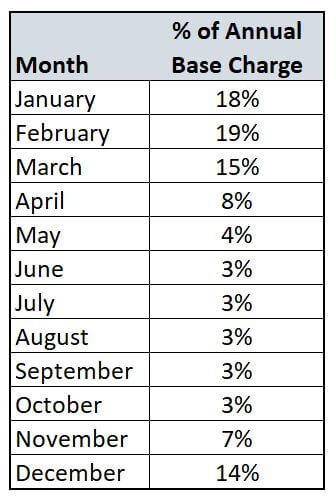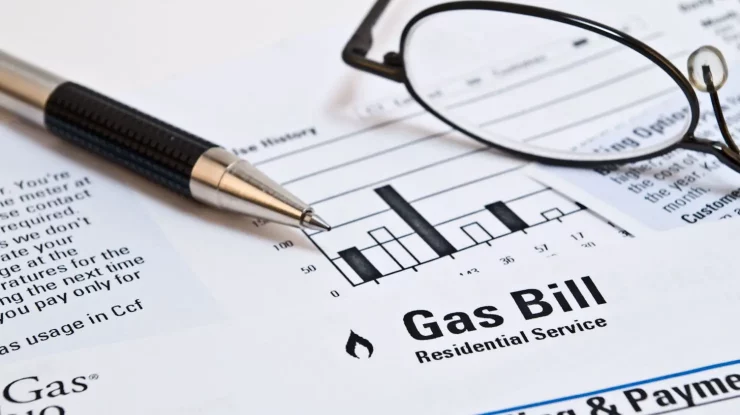If you use natural gas in Atlanta, Decatur, Savannah or other areas served by Atlanta Gas Light (AGL), you’ll see AGL Pass-Through Charges on your bill.
These pass-through charges have a complicated calculation. And at times they may seem to have little to do with how much natural gas you’ve actually used!
Once you understand what’s included in the AGL Pass-Through Charge or Base Charge, you’ll be better able to make sense of your bill.
A Little Refresher on Gas Deregulation in Georgia
First, unless you’re new to Georgia, you already know that Georgia gas is deregulated.
That means you pick your own supplier for natural gas in Georgia. That supplier will give you a fixed rate or other benefits for choosing them. You can compare fixed rate natural gas suppliers online, using tools like NaturalGasPlans (this web site.)
Your supplier sends your monthly gas bill, which will include delivery charges from Atlanta Gas Light (AGL).
But what are those pass-through charges from AGL? And why do AGL pass-through charges sometimes seem like they are unrelated to how much gas you use?
Understanding the Charges on Your Natural Gas Bill in Georgia
When you look at your natural gas bill in Georgia, you’ll likely see these line items on your bill:
- Gas Supply Charge. This is the amount of natural gas you consumed multiplied by your price per therm. You can shop for the lowest gas supply charge for your gas bill.
- Supplier Monthly Base Charge. This monthly fee may be labeled customer service charge or base charge. It covers the supplier’s overhead for billing and service, even if you aren’t using any natural gas. You’ll find the monthly base charge highlighted in product details on NaturalGasPlans.
- AGL Pass-Through Charge. Charges to deliver natural gas to your home or business. We’ll go into that below.
- Sales Tax. Everyone’s favorite. The government’s share of the bill.
The rest of this article focuses on the AGL Pass-Through Charge.
What is the AGL Pass-Through Charge?
AGL is a regulated utility. Because of this, they receive a guaranteed return on their investment to maintain the gas delivery system. Their charges are approved by the Georgia Public Service Commission.
The AGL Pass-Through Charge or Base Charge covers AGL’s cost to deliver gas to your home or business, maintain pipelines, store gas and read meters.
Your supplier bills this charge for AGL, with no mark-up. You’ll pay the same AGL Pass-Through or Base Charge no matter what supplier you pick.
Comparing gas bills with your neighbor? Just compare the supply portion. Every home and business pays a different AGL Base Charge, based on your Dedicated Design Day Capacity (DDDC) factor. More on that below. But first…
What’s included in the AGL Base Charge?
There are a number of elements that make up the AGL Pass-Through Base Charge.
These parts of the AGL base charge are the same amount of money for every account, based on your customer class (residential vs. commercial)
- Customer Charge: This is a fixed monthly fee that pays for the gas connection to your home or business. The residential service charge is currently $20 per month per meter for residential customers.
- Ancillary Service: This is a meter reading charge. The charge is currently $0.71 per month per meter.
- Social Responsibility Fee: AGL offers a senior citizen discount on natural gas. This fee pays for the discount program. If you are receiving the senior citizen discount, this fee is waived.
But these parts of the AGL base charge vary depending on your Dedicated Design Day Capacity (DDDC). This is a measure of how much gas you use when the gas system is at its max capacity of use. AGL uses your DDDC to calculate these 4 parts of your Base Charge:
- Firm Distribution Charge: This is the cost of delivering gas to your home.
- Peaking Service: The cost of operating AGL’s gas storage facilities on the coldest day of the year, applicable only to customers for natural gas in Atlanta, Macon and Valdosta Georgia.
- Environmental Response Cost Charge: The cost to clean up environmental damage at manufactured gas plant sites. (Manufactured gas was created from coal or oil in the past, and these sites need to be cleaned up to avoid risk to our drinking water.)
- Franchise Recovery Fee: Costs that AGL must pay to local governments to use public right of ways for gas delivery.
And all of these elements combined make up your AGL Pass-Through Base Charge.
How is the DDDC Factor Calculated?
Since your DDDC plays a big part in your AGL Base Charge, let’s dive into that more.
AGL uses your DDDC to calculate your distribution charge, environmental response cost, franchise recovery fee and peaking service (if applicable).
Think of your DDDC as, “When the AGL gas delivery system was at its most stressed point for natural gas usage, how much of that did I cause?”
AGL has to make sure there’s enough pipe and storage capacity to meet the total amount of gas that’s needed when it’s cold. They divide that cost among all customers based on your usage.
AGL calculates your DDDC annually in September. Your DDDC is based on how much gas you used during the coldest time period of the prior winter vs. what you use on a typical summer day.
You’ll find your DDDC on your bill, usually near your account number.
Why is My AGL Pass-Through Charge Different Every Month?
Your AGL Pass-Through Charge or Base Charge is different every month because part of it is an annual fee for service. And instead of paying it as 1/12th of the fee every month or paying it all upfront? You pay a different percentage of it each month.
As we reviewed above, AGL sets part of your pass-through charges based on the type of meter you have (business vs. residential). Those are monthly charges. But the rest of the pass-through charges are annual, and based on your DDDC.
You pay a portion of the annual base charge each month, as follows:

So yes, even if you don’t use natural gas in the summer, you will still have a natural gas bill to cover your AGL Base Charge. But it’s better than paying for it all at once!
FAQs About AGL Pass-Through Charges and DDDC
The Dedicated Design Day Capacity (DDDC) factor is tied to a specific meter location. That means you’ll be billed based on the DDDC of your new home. However, that means that your gas bill that first year is based on the prior owner or tenant. If they liked to crank up the heat, and you focus on energy conservation? Your gas bill may be higher the first year you live in your new home. Since AGL resets the DDDC every September, it may take a little while for your bill to fully reflect your lifestyle.
To calculate the Dedicated Design Day Capacity (DDDC) factor for a new construction home or business, AGL estimates the peak usage level based on square footage, type of construction and number of gas appliances. Many new homes are moving toward electric-only for heat and appliances. If that’s the case with your new home, you may not need to set up natural gas.
Your Dedicated Design Day Capacity (DDDC) factor is based on how you use natural gas to heat your home on the coldest time of the year vs. how you use natural gas in the summer.
You can lower your DDDC by being mindful of how you heat your home. Use the correct thermostat settings for winter to cut your natural gas usage. You should also perform a DIY home energy audit to find and fix where you’re wasting heat. Watch the weather reports to keep track of cold weather and conserve energy on those days.
